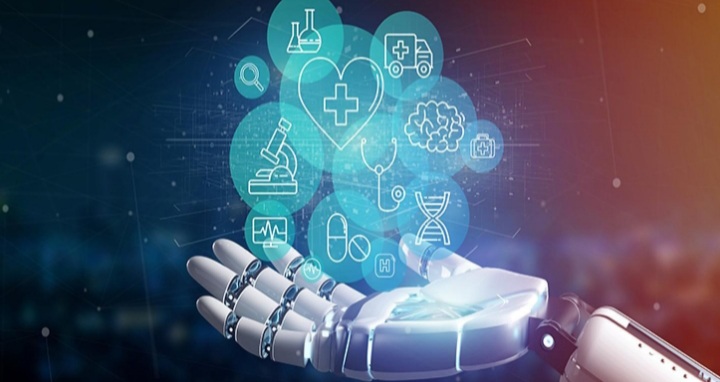ARTIFICIAL INTELLIGENCE - A MAN MADE MINDS IN HUMAN HEALTH CARE RESEARCH SYSTEM
ARTIFICIAL
INTELLIGENCE - A MAN MADE MINDS IN HUMAN
HEALTH CARE
RESEARCH SYSTEM
Many drugs take
about 10 years or more to come on the market, cost billions, and have the
potential to undermine the organization's chances of failing late-grade tests
and pouring out a lot of thought. Venture forward artificial intelligence (AI);
a resilient mindset is very important in caring for these problems and sees it
continuously as the future of successful drug development. With smart computers
ready to store and process incomprehensible educational stores, the confidence
was that they would be able to become 'cradle experts', assist or surpass
doctors in their activities such as analysis.
To improve clinical trials, researchers in the f1ield of medicine are turning to artificial intelligence (AI). Encouraged by the rapidly growing numbers of medical data available to researchers, including those provided by electronic health records and wearable devices, high-tech technology has the potential to save billions of dollars, accelerate medical progress and increase access to diagnostic treatment.
Artificial
intelligence is intelligence incontestable by machines, in contrast to the
natural intelligence displayed by humans and animals, which involves consciousness
and emotionalism. The excellence between the previous and therefore the latter
categories is usually revealed by the acronym chosen.
Artificial intelligence in Health Care
research:-
Artificial
intelligence (AI) is increasingly being used in patient care to improve
diagnosis and to find appropriate treatment options. Although there is a clear
framework for the control of drug testing and medical devices, the majority of
AI employed in health care is not regulated. AI is usually trained with a large
amount of data, and its results are initially verified against that of
decision-makers.
Like new drugs or
medical devices, an AI health system can have unknown benefits and lead to
unexpected problems. However, there are no established clinical strategies for
systematic testing of AI in health care. Big Data and Artificial Intelligence
technologies are complimentary as Artificial intelligence can help to
synthesize and analyse ever-expanding data.
Benefits of AI:-
v
Automation.
v
Smart Decision Making.
v
Enhanced Customer Experience.
v
Medical Advances.
v
Research and Data
Analysis.
v
Solving Complex Problems.
v
Business Continuity.
v
Managing Repetitive Tasks. v Minimizing business errors
v
Increased business efficacy.
Scope of AI in Clinical Research:-
v It helps in decisive the pattern of however well the drug is
performing within the patients.
v It helps in decisive the pattern of aspect effects or adverse events
that area unit seen in several patient pools. So this can cause efforts for
avoiding such side effects at intervals the patients.
v The post marketing study is also a large task as a result of it
involves a vast variety of data that is tough for traditional eyes to analysis
and predicts the defects in terms of effectualness and safety.
Advantages of Artificial Intelligence:-
The AI modification
of clinical trials begins with the development of a follow-up rule, reducing or
replacing test results that may be more responsive to change than traditional
methods and using remote-connected technologies that reduce the need for
long-distance patients to visit sites. Reliance on traditional site test
results may lead to the development of sub-standard protocols that can reduce
enrollment and lead to improper patient retention, driving trial costs or even
program planning.
Incorporating AI
into massive knowledge has the potential to make comprehension from real-world
knowledge sizes (RWD) into protocol designs. Objective data from devices and
sensors captured with real-time data from people as they go about their normal
lives has the potential to obtain relevant clinical information and be used to
evaluate and improve experimental objectives, storage facilities and
procedures.
In the past,
researchers relied heavily on oral or written evidence from patients during
clinic visits and also directed clinical observations to monitor patient
progress. This irrefutable evidence is unreliable, often inconsistent and
internal and does not provide sufficient detail for analysis and decision
making and while the reported patient outcomes are crucial to any trial, the
addition of objective data to add context to independent assessment is
particularly important.
Collecting
real-time, real-world patient data on wearable devices, on the other hand, can
help generate consistent evidence, targeting disease outbreaks and the effects
of drug use on disease symptoms. Today there are many types of biometric
signals that can be captured including heartbeat, blood pressure and sleep
activity collected 24/7. It is much richer and more detailed than the data
collected in the clinic, and has the potential to respond better to change.
AI analysis of
remote lives data and can detect where patients may be noncompliant, allowing
clinical staff to intervene before patient data is extracted.
Ø AI drives down the time taken to perform a task. It permits
multi-tasking and eases the work for existing resources.
Ø AI allows the execution of till now complicated tasks while not
important price outlays.
Ø AI operates 24x7 while not interruption or breaks and has no period
of time Ø AI augments the capabilities of differently abled individuals
Ø AI has mass market potential; it can be deployed across industries.
Ø AI facilitates decision-making by creating the method faster and
smarter.
Artificial Intelligence (AI) and its Future:-
Artificial
intelligence (AI) is increasingly being used in patient care to improve
diagnosis and to find appropriate treatment options. Although there is a clear
framework for the control of drug testing and medical devices, the majority of
AI employed in health care is not regulated. The firmly controlled medicinal
services industry has made little utilization of counterfeit consciousness in
this way. One of the issues has dependably been that social insurance is
excessively mind boggling. Keeping in mind the end goal to foresee anything
around one's wellbeing, we require data on demographics, proteins,
multi-quality cooperation’s, ecological impacts, and an entire host of
different features. Those conceivable outcomes are startling and energizing.


Comments